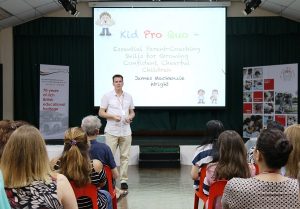How vital is Parent-Teacher Communication?
 Schooladvisor Team
Schooladvisor TeamIn order to answer the above question, it is essential to be clear on why parent-teacher communication is important. The answer can best be illustrated by the ‘Great Ormond Street Hospital’ logo, ‘The child first and always’. All communication is about ensuring the very best for the child and how to ensure they are happy, healthy and reach their potential as learners.

The way parent-teacher communication takes place has evolved over the last ten to fifteen years, especially with the advent of technology. Schools now offer Parent Portals and Gateways which offer a wealth of information. Workshops, frequently presented with PowerPoints and the like, are offered to parents as a way of communicating teaching ideas and suggestions to help learning take place at home. Emails between parents and teachers are now frequently the first rung of communication about individual matters. However, it is the face to face interaction during Parent Teacher Conferences which still serves as the most valuable method and offers a dialogue where information and ideas are shared. Impromptu meetings serve the same purpose as it is within this forum that parents and teachers can communicate most effectively and feel they are being heard on a personal level.
Establishing a climate of trust between parents and teachers is essential if both parties are serious about supporting and nurturing each child in their care. Children frequently act differently when they are in school and at home; actions which, for the most part, are a perfectly healthy part of development. However, the difference in behaviours between home and school can be marked and can, at times, create a strain in either one of these environments. By keeping a continuous, yet confidential dialogue going, there is a stronger possibility of understanding if there are any potential problems and consequently discovering solutions. In other words, teamwork between parents and teachers can help create positive results, whereas a lack of openness can often compound a problem.
Parents from all walks of life, even those who are teachers, all want to know how their child is doing at school. Knowing their son or daughter is at an expected level ensures they feel their child is managing well and consequently a happy and confident student. Sometimes a child experiences a difficulty in one area of the curriculum, a situation which parents want to know about so that they have a clear idea about what the school is going to do in order to support their child. But it is generally the case that parents want this open dialogue so that they too can encourage their child and help them in this particular area. Once again, the child is at the center of everyone's concerns resulting in a combined effort to help forge a positive outcome.
 Parent Workshop at The Alice Smith School
Parent Workshop at The Alice Smith School
Having an open dialogue between parents and teachers can result in a certain degree of tension; discussing a child’s well-being has the potential for being an emotive topic. This should not deter from either party maintaining clear lines of communication as long as both parents and teachers maintain respect for one another and a high degree of professional courtesy is striven for. If wanting the best for each child is the end goal, then both parties should aim for a high degree of tolerance even if chosen pathways do not always converge.
Maintaining that the child should be at the center at all times surely gives rise to the possibility that this article’s title be extended to ‘How vital is Parent/Teacher/Student communication?’ Placing a high value on the students having a voice is now integral to the fabric of most schools. Giving them a platform on which to voice their opinions and thoughts about themselves and their environment provides the crucial third side to the triangle of dialogue between the three parties. Helping the children to develop an imaginative, thoughtful and confident voice should ensure ‘The child is first and always’.
By Harriet PowellPrimary Campus, Year 5 LeaderThe Alice Smith School
Recent Articles
- What Should You Be Looking for in a Preschool?
- HELP Education Group Unveils New Sports Oval in Subang 2 Campus
- Exploring the Homeschooling Path: What Parents Need to Know Before Taking the Leap
- More Parents Are Now Opting for International Schools in Malaysia
- AISM Students Who Dream Big and Build Bigger

